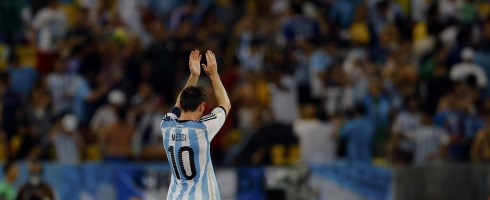It was the 64th minute, and a Maracana filled with Argentine supporters began to jeer one of the best players the world has ever seen. It is incredible to think that Lionel Messi still has work to do to win the unadulterated love of his compatriots, yet this evidence suggests he does.
Messi received a great reception before the game, but there were mumblings of dissent just before the midway point of the second half after he skied a free kick from a decent position. This is the man who was named the planet’s best player four times in a row, who became Barcelona’s all-time top scorer at the age of 24, who has claimed six Spanish league titles and three Champions League medals, all before his 27th birthday.
These achievements are cantered around Messi’s time in Europe, yet he still has 40 goals for Argentina in 88 appearances, won Olympic gold in 2008, and was named young player of the tournament as his country finished runners up in the 2007 Copa America.
However, just 60 seconds after the inception of the disapproval, he exploded into life with a classic darting one-two and precise finish having avoided Bosnia’s defenders. The relief and joy was apparent in his celebration. Indeed, the focus that was placed on his Albiceleste shirt was poignant as he wheeled away in raptures with the No.10 adorning his back finally seeming less of a burden as his second World Cup goal was arrived eight years after his first.
Just a few minutes after the jeers towards their captain began to surface, the very same blue and white clad fans were bouncing up and down in the stands hailing the little magician who has been labelled ‘the Catalan’ in his homeland.
It is easy to accredit this volatile attitude to the fickle nature of football fans, but that is to fail to address the true issues behind Messi's struggle to win the affections of so many of his fellow Argentines. In addition to what they believe to be sub-standard performances for the national team compared to his heroics for Barcelona, they resent his perceived defection to Europe at such an early age, when at just 13-years-old he left Newell’s Old Boys for Camp Nou.
Many others began their careers at the same Rosario club as Messi, including Gabriel Batistuta, Roberto Sensini, Walter Samuel and Gabriel Heinze. Yet they did not struggle to win the fondness of supporters as Messi has on the international scene, despite moving to Europe early in their careers.
The huge factor that has seemingly been overlooked by those Messi left behind is that Barcelona were willing to pay for his growth hormone deficiency treatment, whereas Buenos Aires’ River Plate, also interested in the talented youngster, were not. This aspect of his move to Spain at such a tender age should not be underestimated. It was a crucial point in his development.
Messi has consistently shown his loyalty to Argentina, despite a debut to forget when he was sent off just a couple of minutes after coming on as a substitute against Hungary. He rejected the opportunity to represent Spain at Under 20 level, and implored Barcelona Coach Pep Guardiola to allow him to play in the 2008 Olympics.
Perhaps the biggest problem Messi faces when it comes to his appreciation in Argentina is that he simply is not Diego Maradona. Messi already has more goals in fewer appearances for Argentina than El Pibe de Oro, yet while the mercurial Maradona departed his homeland for Europe and Barcelona in the same way Messi did, it came at the age of 22 after making his mark in the national game for Argentinos Juniors and winning a League title in his year at Boca Juniors. Plus, of course, Maradona delivered the World Cup.
And so to the crux of the matter. The success at Mexico 1986 has bestowed upon Maradona an unrivalled affection from Argentinian football followers, something with which Messi has been unable to compete. However, should he inspire victory this summer on the soil of rivals Brazil, Messi would emulate his revered predecessor in spectacular fashion.
It would also be a significant blow against his own great nemesis Cristiano Ronaldo, who this year took Messi’s Ballon d’Or away from him. There would be no better way to remind the world of his mercurial talent than by winning football's greatest prize.
When Messi was 18, Maradona proclaimed: “I have seen the player who will inherit my place in Argentinian football and his name is Messi.” Winning the World Cup in the Maracana would surely be enough to secure undying love in his homeland, and could elevate Messi to a level all of his own.

